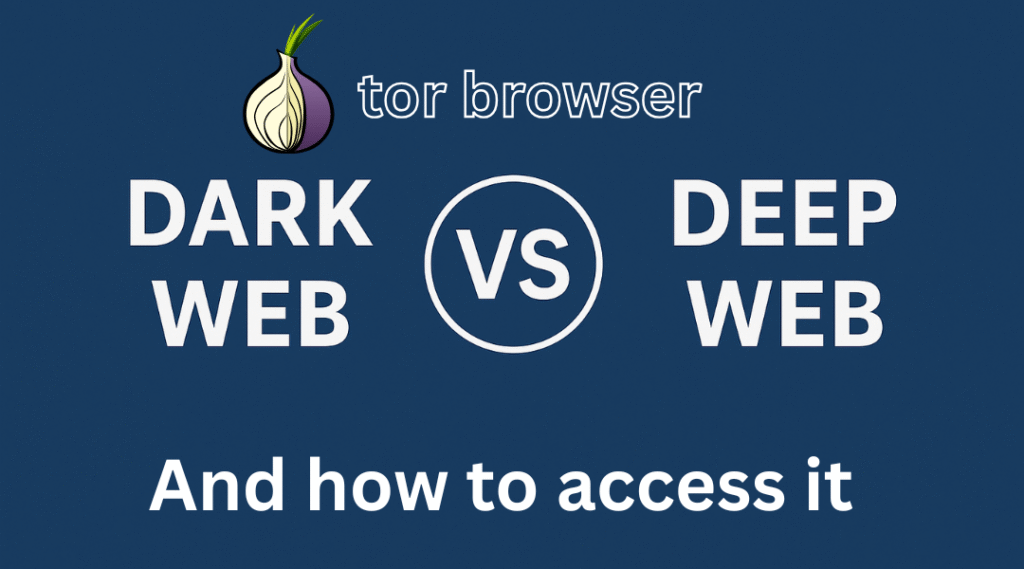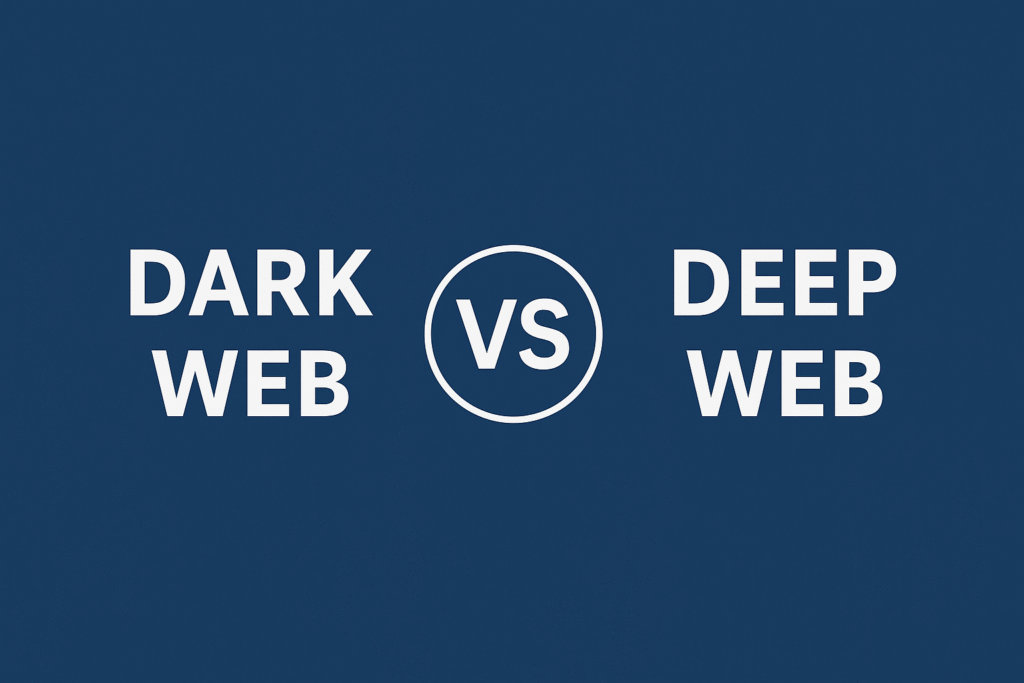1. Introduction

If you’ve ever heard the terms “dark web” and “deep web,” you might think they’re the same thing. The truth is, they’re not. These two parts of the internet are very different in purpose, usage, and even legality.
The terms are often used interchangeably, which adds to the confusion. This article breaks down both concepts in the simplest way possible so you can understand what they really mean and how they impact your everyday online life.
We use the internet daily for all sorts of tasks googling things, checking social media, sending emails. But did you know that the version of the internet you use regularly is just a tiny part of what actually exists? Beneath the surface, there’s a massive chunk of content hidden from search engines and regular users. That’s where the deep web and dark web come into play.
2. Understanding the Surface Web
You know when you Google something and get a bunch of regular websites news articles, Wikipedia pages, online stores, stuff like that? That’s the surface web, the part of the internet search engines can see. But here’s the crazy thing that’s only about 4-5% of the whole internet.
The rest? It’s hidden. We’re talking about the deep web (stuff like your email inbox or private databases) and the dark web (the sketchy, anonymous part).
A good way to picture it is like an iceberg. The little bit sticking out of the water? That’s the surface web what we all use every day. But underneath, there’s a huge, unseen chunk that makes up most of the internet. Wild, right?
Also read
3.What is the Deep Web? (And No, It’s Not as Scary as You Think)
You’ve probably heard whispers about the “deep web” maybe in a conspiracy video or a thriller movie where hackers type furiously on glowing keyboards. But here’s the truth: you use the deep web every single day, and it’s not some dark, mysterious underworld.
So, What Actually Is the Deep Web?
The deep web is just the part of the internet that doesn’t show up in Google searches. That’s it. No cloak and dagger stuff just pages hidden behind logins, paywalls, or private databases.
If you’ve ever logged into an account to see something personal, congrats you’ve surfed the deep web.
Why Does the Deep Web Exist?
Simple: privacy and security. Imagine if anyone could Google your emails, bank statements, or private messages. Yikes. The deep web exists to keep your sensitive info out of public search results.
Is the Deep Web Dangerous?
Nope! It’s mostly boring, practical stuff like checking your work schedule or paying bills online. The deep web isn’t the same as the dark web (that’s a whole different topic).
Final Thoughts
Next time someone says “deep web” like it’s something sinister, you can laugh. You’ve been using it all along every time you log in to anything.
The real question is: What’s in your deep web? (Hopefully nothing weirder than old emails and half-finished Netflix shows.)
4. What is the Dark Web?
The Dark Web: The Internet's Shady Back Alley (But Not Entirely Evil)

Okay, let’s talk about the dark web the part of the internet that sounds like something out of a cyber-thriller. Yes, it’s where hackers, black markets, and sketchy deals exist. But it’s also used by whistle blowers, journalists, and people fighting censorship. So, what’s the real deal?
How Do You Even Get to the Dark Web?
You can’t just Google it. The dark web is a hidden slice of the deep web, and you need special tools to access it like the Tor browser. Tor wraps your connection in layers of encryption and bounces it through servers worldwide, making you (almost) anonymous. Websites here end in .onion, and you won’t find them on regular browsers.
What’s Actually on the Dark Web?
It’s a mixed bag. On one hand, you’ve got:
- Whistleblowing sites (like SecureDrop for leaking info safely)
- Anonymous forums for political dissidents
- Uncensored news in countries with heavy internet restrictions
But then there’s the ugly side:
- Black markets selling drugs, stolen data, fake IDs
- Hacking services (DDoS attacks, malware for sale)
- Other illegal and disturbing stuff we won’t even get into
Is It Illegal to Just… Go There?
Nope. Visiting the dark web isn’t a crime (in most places). But what you do there can be. Buying illegal goods, hiring hackers, or sharing harmful content? Yeah, that’ll get you in trouble.
So… Should You Check It Out?
Honestly? Unless you’re a journalist, activist, or just really curious (and okay with stumbling onto some weird stuff), there’s not much reason to. The dark web is slow, clunky, and let’s be real—kinda creepy.
5.Deep Web vs. Dark Web: What's the Real Difference?
Think of the internet like a house:
Deep Web = Your Private Rooms
It’s just stuff hidden behind login screens
Your emails, bank accounts, Netflix history
Nothing scary you use it every day
Dark Web = The Masked Party in the Basement
Need special invite (Tor browser) to get in
Some good folks (journalists, activists)
Some bad apples (hackers, black markets)
Not illegal to look, but watch your step
Key Difference:
- Deep web hides your stuff to protect it
- Dark web hides people to keep them anonymous
Bottom Line:
The deep web is your normal online life. The dark web? Interesting to read about, but you probably don’t need to visit. Most of what you hear is exaggerated – the reality is more boring (and less scary) than the movies make it seem.
The Dark Web: A Hidden Side of the Internet
The dark web is a part of the internet not indexed by search engines, accessible only through tools like Tor. It’s known for anonymity both for privacy seekers and illegal activities. While some use it for secure communication or bypassing censorship, it also hosts black markets, hacking forums, and other shady dealings.
Not the Deep Web: The deep web includes private databases (like emails), while the dark web is intentionally hidden.
Anonymity Rules: Users and sites hide identities, making it a hub for whistle blowers and criminals.
Risks: Scams, malware, and law enforcement stings are common. Curiosity can lead to trouble.
